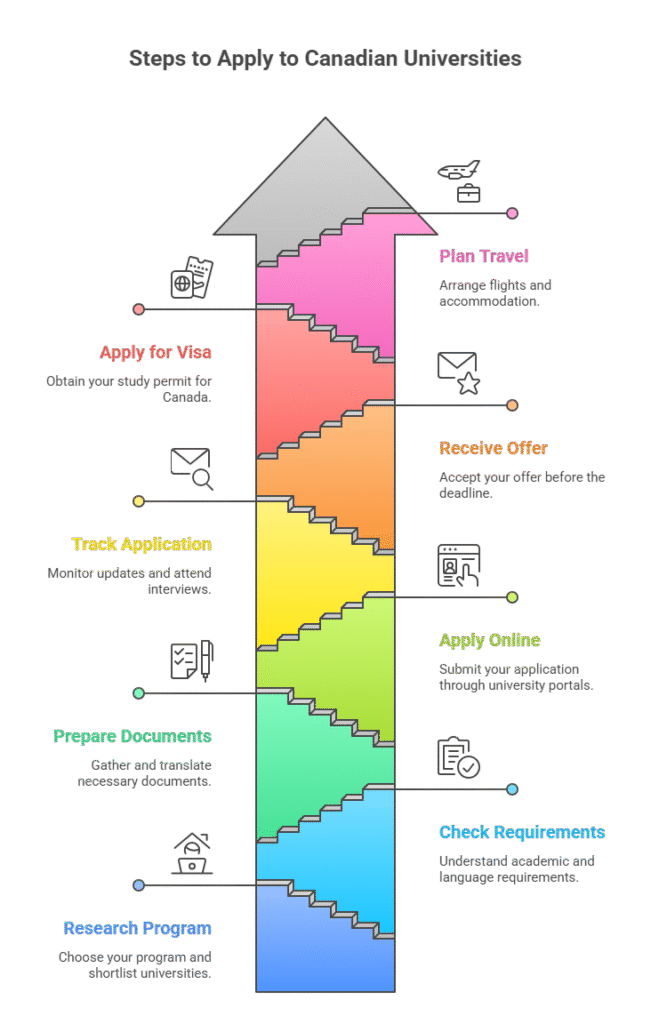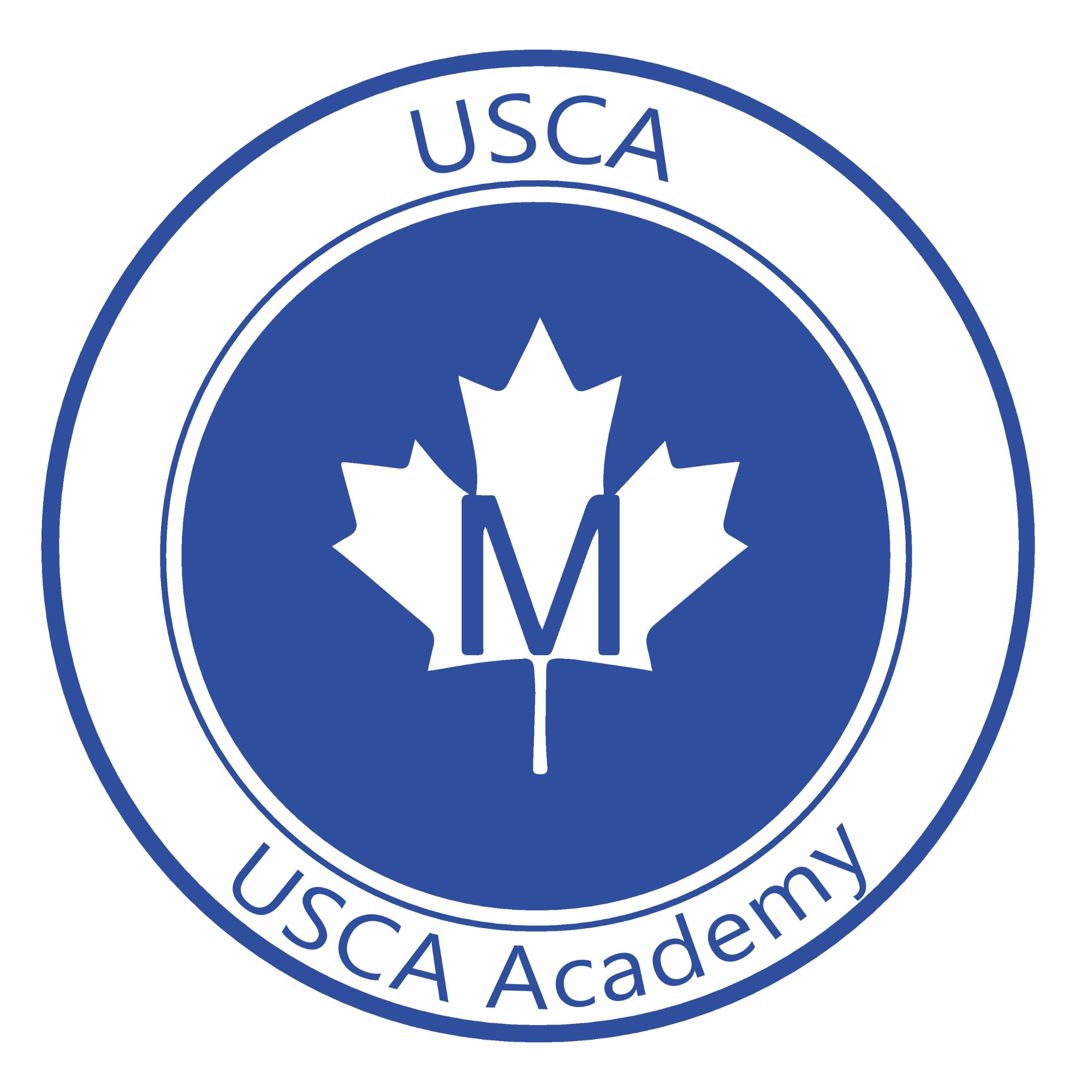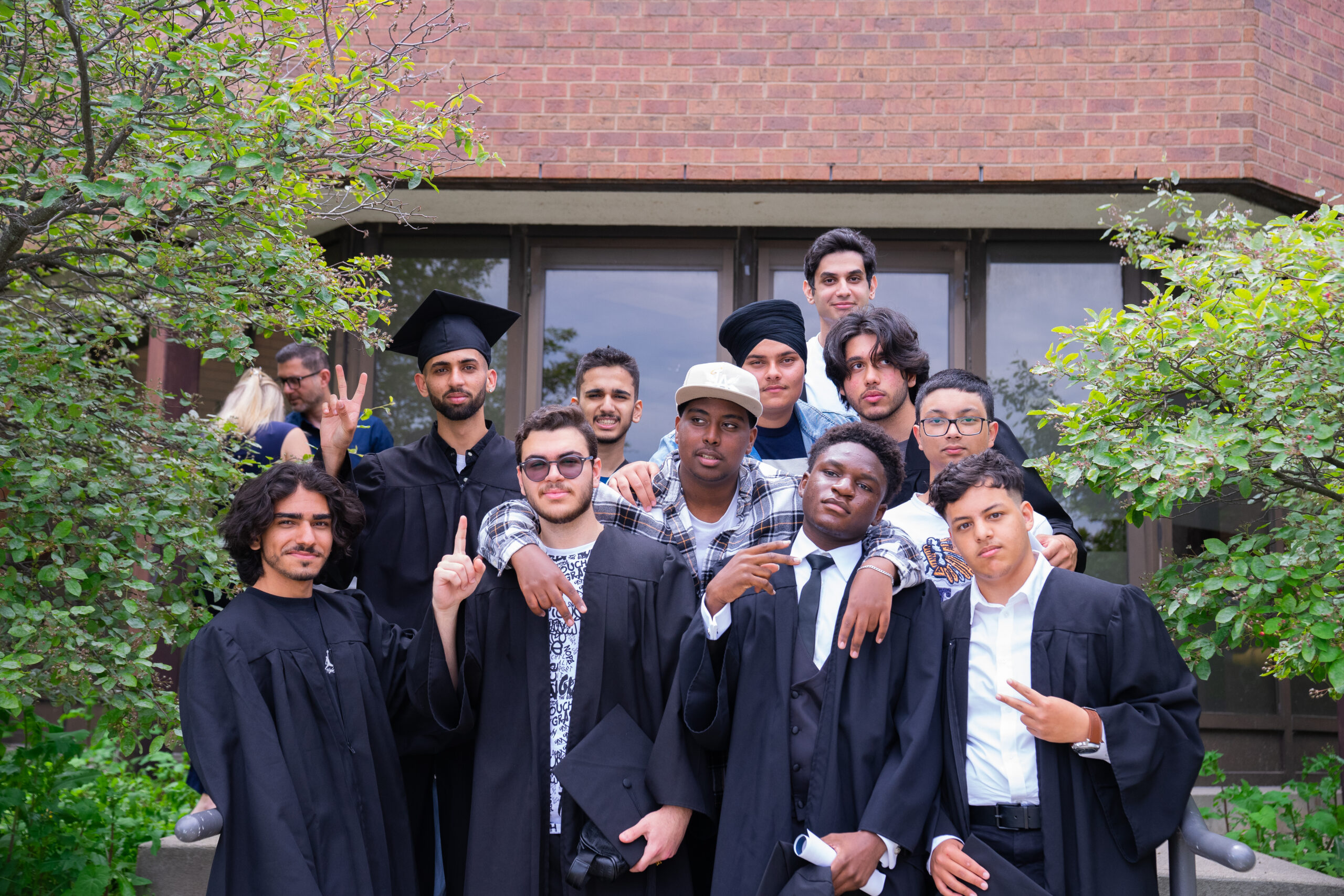Detailed comparison of public universities in canada for international students has earned excellence as a worldwide destination for international students because its public universities deliver top-notch education through diverse programs in multicultural study environments. This extensive guide will explain how Canadian public educational institutions benefit international students regarding selection and admission processes, along with which institutions deliver maximum value. Let’s learn how to study in Canada.
Top 15 Public Universities in Canada for International Students
The following list comprises Canada’s top-ranked public institutions, which offer scholarships for international students while providing access to various undergraduate as well as postgraduate study options. Here’s a complete list of public universities in canada for international students offering a wide range of undergraduate and postgraduate programs.
| University | Avg. Tuition Fee (UG/PG) | Course Duration | Top Courses | Scholarships | Location & Campus Life | Why It’s Great for Intl. Students |
| University of Toronto | $58,000 / year | 3-4 years | CS, Engineering, Life Sciences | Yes | Toronto – Vibrant, Diverse | Ranked #1 in Canada |
| University of British Columbia | $45,000 / year | 3-4 years | Forestry, Environmental Science, Data Science | Yes | Vancouver – Scenic, Urban | Strong research opportunities |
| University of Alberta | $29,500 / year | 3-4 years | Petroleum Engg., Business, CS | Yes | Edmonton – Affordable | Top scholarships & internships |
| Université de Montréal | $18,000 / year | 3-4 years | Arts, Medicine, Law (French-medium) | Yes | Montreal – Cultural Hub | Low cost of living |
| University of Waterloo | $40,000 / year | 3-4 years | Engineering, Co-op Programs | Yes | Waterloo – Tech Ecosystem | Best for tech & innovation |
| Western University | $35,000 / year | 4 years | Health Sciences, Business | Yes | London, ON – Friendly & green | High employment rate |
| University of Ottawa | $30,000 / year | 3-4 years | Political Science, Public Admin | Yes | Bilingual Campus | Great for public policy |
| Dalhousie University Simon Fraser University | $26,000 / year $31,000 / year | 3-4 years 3-4 years | Marine Biology, NursingMedia Studies, Business | Yes Yes | Halifax – Coastal Burnaby/Vancouver | Strong healthcare programs Great co-op & work-study options |
| University of Victoria | $25,000 / year | 3-4 years | Oceanography, Humanities | Yes | Victoria – Island Campus | Ideal for eco-focused studies |
| York University | $30,000 / year | 3-4 years | Law, Film, Business | Yes | Toronto – Metro Campus | Rich academic diversity |
| University of Regina | $18,000 / year | 3-4 years | Petroleum, Indigenous Studies | Yes | Saskatchewan – Affordable | Low tuition & great ROI |
| McGill University | $45,000 / year | 3-4 years | Medicine, Arts, Law | Yes | Montreal – Cosmopolitan | Ivy League of Canada |
| Queen’s University | $41,000 / year | 3-4 years | Business, Law, History | Yes | Kingston – Classic Campus | Elite programs |
| University of Calgary | $28,000 / year | 3-4 years | Energy, Engineering, Geoscience | Yes | Calgary – Safe & affordable | Industry-aligned programs |
Why Choose a Public University in Canada?
Canadian national universities receive state funds to deliver top-notch education at fees lower than those charged by most private institutions. The regulatory bodies carefully maintain high-quality standards, which result in effective academic environments coupled with top facilities and promising future abilities for students.
Advantages of Public Universities in Canada
- The institutions maintain their position as internationally acclaimed learning centres which deliver complete educational programs.
- Lower Tuition Fees: These are more affordable than in many other Western countries.
- Diverse Campus Life: Exposure to students from over 150+ countries.
- Internationals who want to work alongside their studies can work 20 hours per week each semester.
- Post-Graduation Work Permit (PGWP) eligibility.
How to Apply to Public Universities in Canada: Step-by-Step Guide for International Students

Navigating the Canadian university application process can seem overwhelming, but with the right steps, it’s straightforward and rewarding. This section breaks down the essentials for international applicants. The list of public universities in Canada for international students includes top institutions like the University of Toronto, UBC, McGill, and many more.
Understanding Admission Requirements
Before applying, it’s crucial to understand what each university expects in terms of academics, documents, and language proficiency. Requirements may vary depending on the institution and program. Schools in Canada for international students offer world-class education, diverse cultural experiences, and pathways to global career opportunities.
Academic Qualifications and Transcripts
- Most Canadian universities require:
- High school diploma or equivalent for UG programs.
- Bachelor’s degree for PG admissions.
- The academic transcripts must either be converted into English or French for proper evaluation.
English Language Proficiency
Some Public universities in Canada for international students without IELTS by accepting alternatives like Duolingo or proof of English-medium education.
- Duolingo English Test
- English as a Medium of Instruction Letter (for certain nationalities)
- Completion of previous education in English
Your Step-by-Step Application Roadmap
Step 1: Research Your Program and University
Before anything else, choose your program of interest and shortlist the public universities that offer it. There are more than 90 public universities in canada providing high-quality education across provinces and territories.
Top Public Universities in Canada:
- University of Toronto
- University of British Columbia
- McGill University
- University of Alberta
- University of Waterloo
Tip: Use official university websites and platforms likeEduCanada.ca orUniversityStudy.ca to verify programs and eligibility.
Step 2: Check Admission Requirements
The university preparation program Ontario is designed to equip international and domestic students with the academic skills and credentials needed for successful admission to Ontario universities. Each university and program has different eligibility criteria. Common requirements include:
- Academic transcripts (high school or bachelor’s, depending on the course level)
- English language proficiency (IELTS/TOEFL)
- Letters of recommendation
- Statement of purpose or personal essay
- Resume/CV (for PG courses)
- Valid passport
Language Scores (Typical Minimums):
- IELTS: 6.5 overall, with no band less than 6.0
- TOEFL iBT: 86+
Step 3: Prepare and Collect Your Documents
Public universities in alberta canada for international students offer strong academic programs and affordable tuition in cities like Edmonton and Calgary. Organize all your documents early:
- Transcripts (translated if not in English)
- Test scores (IELTS/TOEFL/SAT/GMAT, as required)
- SOP and LORs
- Passport copy
- Resume (for postgrad courses)
- Portfolio (for design or arts programs)
Step 4: Apply Online via University Portal or Provincial Systems
There are two ways to apply:
1. Direct Application via University Website
Top public universities in ontario canada for international students include University of Toronto, York University, and University of Ottawa. Many public universities in canada with scholarships for international students offer merit-based and need-based financial aid to help reduce tuition costs.
- Most public universities allow you to apply through their admission portal.
- You’ll create an account, fill in personal and academic info, upload documents, and pay the application fee.
2. Through a Centralized Provincial System
- OUAC (Ontario Universities) – www.ouac.on.ca
- ApplyAlberta – www.applyalberta.ca
- EducationPlannerBC – www.educationplannerbc.ca
- Application Fee: Typically CAD 100–150 per university/program.
Step 5: Track Application and Attend Interviews (if required)
After submission:
- Check your email and portal for updates or document requests.
- Some programs may invite you for an online interview or submit additional materials like video statements or portfolios.
Step 6: Receive Offer Letter
You’ll receive either:
- Unconditional Offer – all requirements met
- Conditional Offer – pending final transcripts or other documents
Tip: Accept your offer before the deadline and follow the university’s instructions to confirm your seat (may require a deposit).
Step 7: Apply for a Study Permit (Student Visa)
Once you have your Letter of Acceptance (LOA), apply for a Canadian study permit:
Key Documents:
- LOA from a Designated Learning Institution (DLI)
- Proof of funds (min. CAD 10,000 + tuition)
- Valid passport
- Immigration forms
- Statement of Purpose
- Medical exam (if applicable)
Apply online via: www.canada.ca
Processing time: 4–12 weeks (varies by country)
Step 8: Plan Your Travel and Accommodation
After visa approval:
- Book your flights early
- Arrange on-campus or off-campus housing
- Pack important documents (passport, LOA, visa approval, academic documents)
Tip: Arrive 2–3 weeks before classes begin to settle in comfortably.
Additional Tips
- Apply early: Some programs have limited seats and rolling deadlines. Start 6–12 months in advance.
- Look for scholarships: Many public universities offer merit-based scholarships for international students.
- Verify DLI status: Ensure your university is a Designated Learning Institution (DLI) to qualify for a study permit and post-graduation work permit (PGWP).
Key Application Deadlines and Timeline
The best public universities in canada for international students combine academic excellence, research opportunities, and supportive campus communities. The application period for Fall Intake spans from January to March.
- Winter Intake: Deadline between September – November
- Summer Intake: Less common, deadlines in February
Navigating Study Permits and Visa Requirements
- Beginning your study permit application requires you to obtain your Letter of Acceptance from the institution.
- The admissions process needs applicants to show proof of funds as well as submit police certificate results and medical exam reports.
- Students must submit their application documents through the Canadian immigrant site IRCC online system.
Affordable Public Universities in Canada for International Students
International students who search for low-cost public universities in Canada can find options within these recommendations. Here are some budget-friendly picks:
Best Budget-Friendly Universities with Low Tuition Fees
- Université de Saint-Boniface – Avg. fees: $8,500/year
- Brandon University – Avg. fees: $9,000/year
- Memorial University of Newfoundland – Avg. fees: $11,500/year
- University of Regina – Avg. fees: $18,000/year
Tips to Minimise Living Costs While Studying
- Students should consider smaller population centres because rental expenses tend to remain lower than in big cities such as Regina and Halifax.
- Students should use their discount student cards to access low-cost public transportation services and eat at reduced prices.
- Share accommodation
- The part-time employment option exists both on and off academic campuses.
Conclusion
Public universities in Canada offer international students a perfect balance of high-quality education, cultural exposure, and affordability. The multicultural higher education system of Canada offers educational possibilities for both international students seeking Ontario public universities and those interested in Alberta institutions.
Frequently Asked Questions About Public Universities in Canada for International Students
1. Are public universities in Canada free for international students?
Public universities across Canada do not provide free education to international students. Since Canadian government-funded universities charge lower tuition than private institutions in America or Britain, they do not provide free education to international students.
2. What are the advantages of public universities for international students in Canada?
Government funding, global recognition, and diverse student bodies.
3. Can I study in Canada without IELTS?
University admission in Canada is possible without IELTS. Some colleges recognise different evidence of English language proficiency besides IELTS.
4. Which province has the most public universities?
Ontario maintains the largest number of publicly funded universities among Canadian provinces. Ontario features the biggest collection of public universities in the country.









